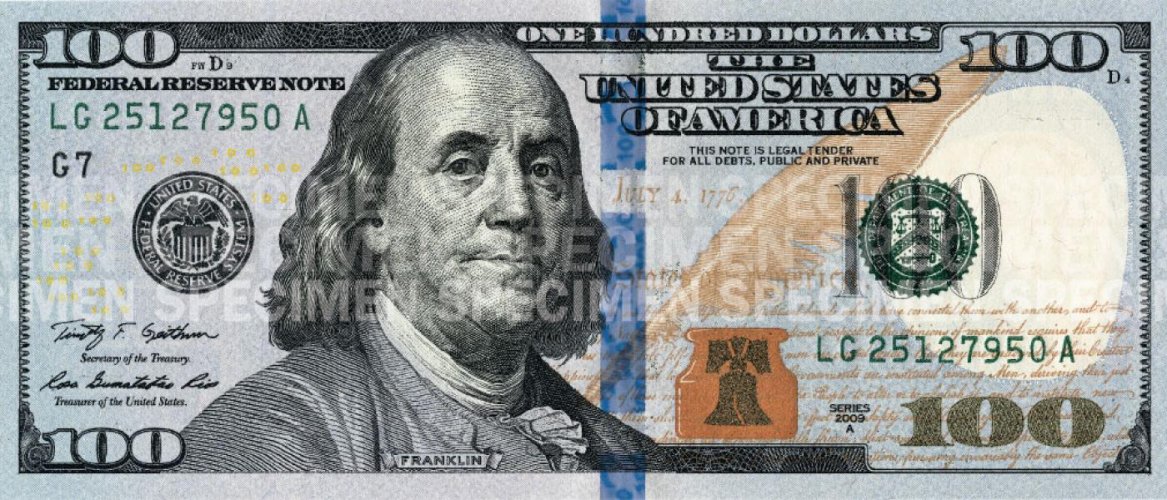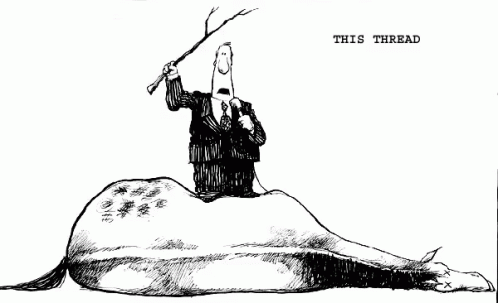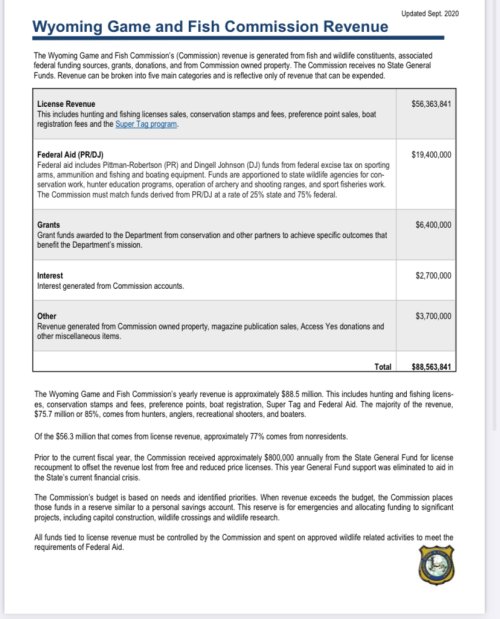Navigation
Install the app
How to install the app on iOS
Follow along with the video below to see how to install our site as a web app on your home screen.
Note: This feature may not be available in some browsers.
More options
You are using an out of date browser. It may not display this or other websites correctly.
You should upgrade or use an alternative browser.
You should upgrade or use an alternative browser.
Devaluing Non-Residents
- Thread starter rjthehunter
- Start date
- Status
- Not open for further replies.
Laszlo Cravensworth
Well-known member
Not sure someone complaining about being mugged is a whiner. Wyoming set up a points scheme for non-residents when residents had no such scheme. Restricts where I can carry a gun while holding a hunting tag yet I can walk anywhere with a fishing tag, a birdwatcher's book or a pair of hiking sticks.
Buy points they said. I did as a non-resident. Wyoming is an amazing place to drive around and take pictures, share a beer with locals and unwind. I have spent money there. I have paid as much in state income tax as any WY resident, too.
Wyoming eventually raised the price of points, of the application and the tag. All these increase as a percentage exceeded any increases to resident costs to apply (no points fees to bother with either, eh?). Now Wyoming has cut the percentage.
Is that sequence which started over two decades ago something I should cheer as a non-resident? I am done with applying in Wyoming. Don't cry for me Argentina but to call me a whiner is a bit much. Also, the next time Wyoming is on fire, don't pick up the phone to call non-resident firemen and water tanker pilots. Whining about "oh, our forests are burning up" is not any more acceptable than how you view your wildlife as your issue to manage and solve.
Don't send you kids to a medical school out of state or any out-of-state college. We, as residents, paid for the schools and you can keep your kids inside your state to gain education post-high school.
Stay out of our professional arenas and stadiums, too. We own those.
I sort of like tribalism. And, whining.
Who told you to buy preference points? I'd wager that it was non-resident advocacy that got the scheme implemented to begin with. "It's getting too hard to draw a tag in a random draw, I need something back for my applications fee"... -paraphrased, probably.
And Non-resident college tuition probably wasn't the best analogy. Perhaps it's not the same discrepancy as tag prices, but you can figure on about 3-5x the resident cost in many places.
1. WildlifeThe phrase Benefit of the people of the state can have a myriad of meanings.
Are outfitters individual citizens of the state, and do their desires matter in this? What about landowners who are individual citizens of the state or even anti-hunters? Is a county that receives significant revenue from outfitters who pay property tax, etc and run their economic enterprise in that place a benefit to the state? What about open lands preservation - what benefit to the state is that?
What defines benefit to the state? If your definition is solely about the allocation of the resource to put an arrow or bullet in it, I doubt that it fulfills the intent of the constitution which holds wildlife to be a condition of the land, not owned by anyone and held in trust for the people of Montana.
2. Funding (economy)
I believe things would improve if we followed that order. We constantly do the opposite.
It's 2024 and the King's Deer is in high demand.
Yessir, you speak a hard truth but it’s the truth nonetheless.
In 2024, any NR still surprised and/or hurt when things change in western states to their detriment has been living under a rock. Best to think about where the puck is going, not where is has been or even where it is now.
Now, here is a bit more grimy reality that seem to offend HT every time I point it out- there is a new near-universal (coming soon to WY and MT) preference point for residents and non-residents alike. Think of these as “the great equalizer.”

I have been saying this for years now.
Personally, regardless of what internet chatter we hear, I don't think Wyoming would be just fine with NR walking away. Unfortunately, they have crybaby canaries in their ear screaming that their 9 (NINE) big game tags aren't enough and that they need ALL the tags.
View attachment 313433
Wyoming (and all states) have other sources of revenue for F&G than license sales. The departments would need to change how they operate. Idaho 2010ish comes to mind when NR dropped for several reasons.
Attachments
BuzzH
Well-known member
Well, my job alone has me working in 10 states every year on BLM, FS, Private, NPS, USFWS, Reservations, etc.Here you go again.
Why don't you auction off some tags? Enough money can solve almost any problem.
Lastly, yeah, I get it. You have worked on behalf of public lands in WY. You're also a resident there. How much have you done in Minnesota? Or how about Wisconsin, or Texas, or Washington, or Maine, or Illinois, or Michigan? You probably stick pretty close to your area of Wyoming, and maybe a little in Montana?
Some of the things I work on are national in scale for all 50 states and include the US Territories as well (Puerto Rico, Virgin Islands, etc.).
So, yeah, I'm pretty invested in public lands.
1. Wildlife
2. Funding (economy)
I believe things would improve if we followed that order. We constantly do the opposite.
OK.
How.
So WY residents just need to cough up about $44 million a year. For the roughly 75,000 resident hunters in Wyoming that's a $578 increase in your yearly licenses.
Or be good with even fewer wardens, biologists, stockings, etc.
Or be good with even fewer wardens, biologists, stockings, etc.
SAJ-99
Well-known member
And they still aren't maximizing revenue.Wyoming eventually raised the price of points, of the application and the tag. All these increase as a percentage exceeded any increases to resident costs to apply (no points fees to bother with either, eh?). Now Wyoming has cut the percentage.
Feel free to opine, but it seems the pecking order is
1) R Landowners
2) Outfitters
3) NR Landowners
4) R Public Land Hunter
5) NR Public land Hunter
6) The Resource
Nameless Range
Well-known member
The phrase Benefit of the people of the state can have a myriad of meanings.
Are outfitters individual citizens of the state, and do their desires matter in this? What about landowners who are individual citizens of the state or even anti-hunters? Is a county that receives significant revenue from outfitters who pay property tax, etc and run their economic enterprise in that place a benefit to the state? What about open lands preservation - what benefit to the state is that?
What defines benefit to the state? If your definition is solely about the allocation of the resource to put an arrow or bullet in it, I doubt that it fulfills the intent of the constitution which holds wildlife to be a condition of the land, not owned by anyone and held in trust for the people of Montana.
Outfitters are beneficiaries. So are the unemployed. So are anti-hunters.
The law is fairly specific, in that it defines individuals who are citizens.
Of course, this is all settled in courts if it comes to it, but no beneficiary should have primacy over another. Citizenship is the bar, not economic contributions.
I wouldn’t argue that it’s not complicated. It’s very complicated. But the trickle-down economic arguments will inevitably obfuscate the issue to the detriment of those who don’t have economic leverage. The plebes will lose when we start entertaining “worthiness” based on business benefit and land ownership. One could argue we already are.
BuzzH
Well-known member
That's not the only hurdle... S.339 google it.I would argue that the US Supreme Court could overrule the Baldwin vs Montana Fish and Game case (1978) to put residents and nonresidents on equal footing for tags, fees, and costs.
Will that ever happen during our lifetimes? Interesting question. [Case cite below if you want to read further.]
That still wouldn’t solve the decrease in wildlife populations. Happy hunting, TheGrayRider a/k/a Tom.
Baldwin v. Fish & Game Comm'n of Montana, 436 U.S. 371 (1978)
Decided:May 23, 1978
PRIMARY HOLDING
The Privileges and Immunities Clause requires only that a state treat all resident and non-resident citizens equally with respect to privileges and immunities that relate to the vitality of the nation as a single entity. Recreational hunting does not fall within this category.
Feel free to opine, but it seems the pecking order is
1) R Landowners
2) Outfitters
3) NR Landowners
4) R Public Land Hunter
5) NR Public land Hunter
6) The Resource
Bingo.
Rather than whining and being butthurt over something we have zero say in, NRs would be wise to think of how to climb that ladder instead.
SAJ-99
Well-known member
I see an easy way to jump from 5 to 2. $$$Bingo.
Rather than whining and being butthurt over something we have zero say in, NRs would be wise to think of how to climb that ladder instead.
rjthehunter
Well-known member
I fully agree with you and Randy that more animals = more hunting opportunities. That's on game and fish though. They set objectives, and give out tags based on that. Are they giving out too many tags in general? Probably. But in 2021, only 12% of elk hunters in MT were non-residents. That's a fairly small percentage. Also, it looks like resident hunter numbers have been declining since 2015 in the latest info I could find.From the quality of our experiences as well as the amount, class, and distribution of animals on the landscape? I'd say Absolutely. Further, I'd argue it has eroded the relationship Montanans have with the trustees of their wildlife. It's just not made up, and I could pull up numerous tables that show it. Relative to resident hunter numbers, NR hunters have skyrocketed. When I am out there, I can see it, and I am not alone.
I agree with BigFin about the best way to increase opportunity being increasing animals on the landscape, but those things are in flux, and I'd argue ratio of allocations are the best proxy for representation, and residents increasingly don't feel represented. I'm well aware NR feel they are getting fleeced and priced out, and I'd agree with that too.
A lot of other things come in to play with population objectives. I'm less interested in that topic at the moment, and am more interested in why non residents given such a small piece of the pie when they're the ones funding the bakery? Also, at what point is it too expensive for people? My guess is that right now it's becoming popular, and it will slowly drop back down as opportunities get harder and harder to come by. Until a point when states realize they've made a mistake.
That’s what I’m getting at. Unfortunate, but is what it is.I see an easy way to jump from 5 to 2. $$$
That’s also the way for number 6 to improve as well. It’s a catch 22 for NR where to spend there green “bonus points” moving forward between the two- which is what this thread is really about I suppose.
antlerradar
Well-known member
Easy, book a with an outfitter.Bingo.
NRs would be wise to think of how to climb that ladder instead.
BuzzH
Well-known member
You need to get your "facts" straight and quit your whining about NR opportunity in Wyoming.I fully agree with you and Randy that more animals = more hunting opportunities. That's on game and fish though. They set objectives, and give out tags based on that. Are they giving out too many tags in general? Probably. But in 2021, only 12% of elk hunters in MT were non-residents. That's a fairly small percentage. Also, it looks like resident hunter numbers have been declining since 2015 in the latest info I could find.
A lot of other things come in to play with population objectives. I'm less interested in that topic at the moment, and am more interested in why non residents given such a small piece of the pie when they're the ones funding the bakery? Also, at what point is it too expensive for people? My guess is that right now it's becoming popular, and it will slowly drop back down as opportunities get harder and harder to come by. Until a point when states realize they've made a mistake.
Pretty tough to say you, as a NR, or any other NR, are getting the shaft here.
NR's are given wayyyy more than their piece of the pie. You want to hear whining, limit NR's to the current tag splits...
Easy, book a with an outfitter.
That’s not my jam at all personally, but yeah- kind of what I was getting at.
rjthehunter
Well-known member
The post you're quoting was in no way related to you, it was a response to Nameless Range. It was about Montana. Not Wyoming.You need to get your "facts" straight and quit your whining about NR opportunity in Wyoming.
Pretty tough to say you, as a NR, or any other NR, are getting the shaft here.
NR's are given wayyyy more than their piece of the pie. You want to hear whining, limit NR's to the current tag splits...
Non-Residents are the main funding of WGFD. Over 70% of WGFD revenue comes from NR hunters, $43 mil from tags, and $19 mil from the federal government.
What percentage of tags go to NRs?
Don't bite the hand that feeds you buzz.
- Status
- Not open for further replies.
Similar threads
- Replies
- 11
- Views
- 2K
- Replies
- 538
- Views
- 78K





